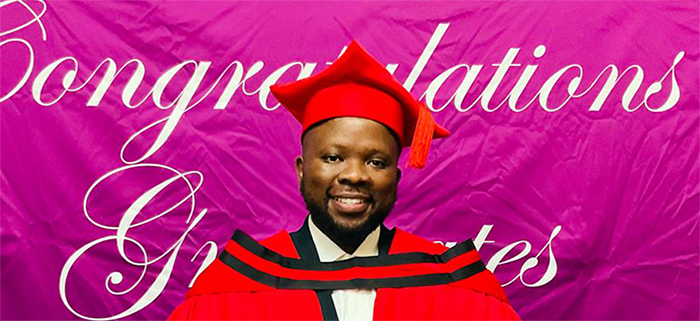
Towards the leading College of Law and Justice in Africa

Dr Sikelela Ndlazi
College of Law Senior Lecturer, Dr Sikelela Ndlazi, recently obtained his doctoral degree during Unisa’s autumn graduation ceremonies. He spoke with Ngwako Mokgotho, and below is their conversation regarding this achievement.
The topic itself inspired me. The area of a legal and formalised artisanal and small-scale mining sector is a novel one in South Africa, and it would have felt incomplete to let the topic go after the LLM stage. It beckoned me to follow it through to the doctoral level.
As clichéd as it sounds, it’s true – the topic chose me. Since my third year of undergraduate law studies, I have always known I would go into constitutional law and human rights. The granular nature of the steps I would take was unclear to me back then. Still, time would usher me through all the necessary steps and experiences to ensure that this is where I end up: equipped with a Doctorate in Constitutional Law and Human Rights, focusing on artisanal and small-scale mining.
My family and my community. There is no substitute for the people on the sidelines who cheer you on during your weak and tired times; they make all the difference between the start and finish lines. In an isolationist and digital age, where human beings crave community and human fellowship more than ever, I have been blessed with the most important ingredients for human success.
My doctoral studies were a natural progression from my master’s studies, which advanced constitutional arguments for the legalisation and development of the artisanal and small-scale mining sector in South Africa. This sector has the potential to serve as a catalyst for socioeconomic development and to improve the realities of many poor communities and groups in South Africa. However, this can only happen if the sector is transformed through policy infrastructure, from illegal mining, or ubu-zama zama, into legal artisanal and small-scale mining.
Fortunately, the Department of Mineral Resources and Energy finally heeded this call and, in 2021, published a draft policy incorporating some of the recommendations my learned colleagues and I made to legalise and develop the sector. However, along with the good that came with the draft policy came significant gaps in knowledge and practice. Chief among these was the negation of the normative role and importance of customary law and traditional leadership in ensuring rights enjoyment for not only artisanal miners in urban areas but also those in rural South Africa, where traditional leadership is still regarded as a governance system worthy of governing the administration of artisanal mineral rights.
Among other findings, my research revealed that the governance systems of natural resources in South Africa lack a culturally relativistic character necessary to administer justice and ensure access to mineral rights for rural South Africans. This gap in the cultural personification of law, systems and procedures reflects policymakers’ ignorance of the realities of the broader rural community of South Africa. This amounts to constitutional dissonance, which erodes public trust and weakens the relationship between the government and its people.
I see my research influencing policy decision-making in a meaningful way, as we have seen with the Department’s publication of the draft policy on regulating the artisanal and small-scale mining sector. Some communities rely on natural resources and the earth’s offerings to make a sustainable living and to dignify their existence as Africans. This research is only a sincere attempt at actioning this ideal.
My supervisor, Prof Angelo Dube, my family, my community and my faith.
My father is, and will always be, my greatest mentor and role model. He managed to build a life for himself with very little support and limited education. The space he carved out for himself through hard work and dedication laid the foundation for his family and the achievements I enjoy today, including this doctorate. Of course, my supervisor has also been an important mentor to me.
The biggest challenge I experienced was the natural limitation of time – it’s simply never enough. I was working full-time as a senior lecturer in charge of two modules. I was also supervising eight LLM students, one of whom graduated cum laude at the top of her class. In addition, I was the sole member managing a major committee, the Higher Degrees Committee.
Nothing. Not one thing. Every step, every lesson, every mistake, every triumph, every loss, and every drop of sweat, tear and laugh were ordained for my journey. I wouldn’t trade that experience for anything.
I am the first in my family to graduate above an undergraduate degree, all the way up to a doctoral degree. I hope I won’t be the last. I want my family and community to realise that the proverbial ceiling does not exist. It all depends on how we interpret and approach our struggles. If we see them as insurmountable, they will be. But if we see them as challenges ripe for the taking and shaping into successes, then they can be overcome.
Start, just start. The details will work themselves out along the way.
It has emboldened me to take on greater, higher challenges. It has given me a fresh perspective on life and learning, and awakened in me a thirst for deeper understanding.
The next step is to broaden my research and its reach by participating in exciting research events and international conferences. I feel honoured to be at this stage of life where I just get to exist in academia and create a name for myself.
I plan to contribute by advancing policy influence and governmental action in the areas of constitutional law and artisanal and small-scale mining, and broadening the philosophies I learnt in my doctoral journey toward developing other informal sectors.
* By Ngwako Mokgotho, Communication and Marketing Specialist, College of Law
Publish date: 2025-07-08 00:00:00.0